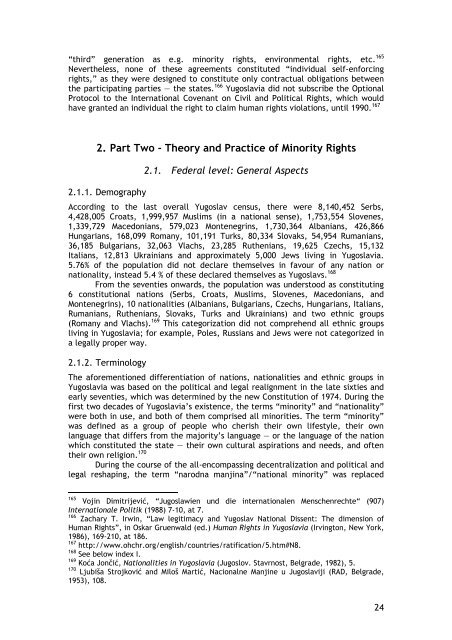Theory and practice of human Rights and minority rights ... - EURAC
Theory and practice of human Rights and minority rights ... - EURAC
Theory and practice of human Rights and minority rights ... - EURAC
You also want an ePaper? Increase the reach of your titles
YUMPU automatically turns print PDFs into web optimized ePapers that Google loves.
“third” generation as e.g. <strong>minority</strong> <strong>rights</strong>, environmental <strong>rights</strong>, etc. 165<br />
Nevertheless, none <strong>of</strong> these agreements constituted “individual self-enforcing<br />
<strong>rights</strong>,” as they were designed to constitute only contractual obligations between<br />
the participating parties — the states. 166 Yugoslavia did not subscribe the Optional<br />
Protocol to the International Covenant on Civil <strong>and</strong> Political <strong>Rights</strong>, which would<br />
have granted an individual the right to claim <strong>human</strong> <strong>rights</strong> violations, until 1990. 167<br />
2. Part Two - <strong>Theory</strong> <strong>and</strong> Practice <strong>of</strong> Minority <strong>Rights</strong><br />
2.1.1. Demography<br />
2.1. Federal level: General Aspects<br />
According to the last overall Yugoslav census, there were 8,140,452 Serbs,<br />
4,428,005 Croats, 1,999,957 Muslims (in a national sense), 1,753,554 Slovenes,<br />
1,339,729 Macedonians, 579,023 Montenegrins, 1,730,364 Albanians, 426,866<br />
Hungarians, 168,099 Romany, 101,191 Turks, 80,334 Slovaks, 54,954 Rumanians,<br />
36,185 Bulgarians, 32,063 Vlachs, 23,285 Ruthenians, 19,625 Czechs, 15,132<br />
Italians, 12,813 Ukrainians <strong>and</strong> approximately 5,000 Jews living in Yugoslavia.<br />
5.76% <strong>of</strong> the population did not declare themselves in favour <strong>of</strong> any nation or<br />
nationality, instead 5.4 % <strong>of</strong> these declared themselves as Yugoslavs. 168<br />
From the seventies onwards, the population was understood as constituting<br />
6 constitutional nations (Serbs, Croats, Muslims, Slovenes, Macedonians, <strong>and</strong><br />
Montenegrins), 10 nationalities (Albanians, Bulgarians, Czechs, Hungarians, Italians,<br />
Rumanians, Ruthenians, Slovaks, Turks <strong>and</strong> Ukrainians) <strong>and</strong> two ethnic groups<br />
(Romany <strong>and</strong> Vlachs). 169 This categorization did not comprehend all ethnic groups<br />
living in Yugoslavia; for example, Poles, Russians <strong>and</strong> Jews were not categorized in<br />
a legally proper way.<br />
2.1.2. Terminology<br />
The aforementioned differentiation <strong>of</strong> nations, nationalities <strong>and</strong> ethnic groups in<br />
Yugoslavia was based on the political <strong>and</strong> legal realignment in the late sixties <strong>and</strong><br />
early seventies, which was determined by the new Constitution <strong>of</strong> 1974. During the<br />
first two decades <strong>of</strong> Yugoslavia’s existence, the terms “<strong>minority</strong>” <strong>and</strong> “nationality”<br />
were both in use, <strong>and</strong> both <strong>of</strong> them comprised all minorities. The term “<strong>minority</strong>”<br />
was defined as a group <strong>of</strong> people who cherish their own lifestyle, their own<br />
language that differs from the majority’s language — or the language <strong>of</strong> the nation<br />
which constituted the state — their own cultural aspirations <strong>and</strong> needs, <strong>and</strong> <strong>of</strong>ten<br />
their own religion. 170<br />
During the course <strong>of</strong> the all-encompassing decentralization <strong>and</strong> political <strong>and</strong><br />
legal reshaping, the term “narodna manjina”/“national <strong>minority</strong>” was replaced<br />
165<br />
Vojin Dimitrijević, “Jugoslawien und die internationalen Menschenrechte“ (907)<br />
Internationale Politik (1988) 7-10, at 7.<br />
166<br />
Zachary T. Irwin, “Law legitimacy <strong>and</strong> Yugoslav National Dissent: The dimension <strong>of</strong><br />
Human <strong>Rights</strong>”, in Oskar Gruenwald (ed.) Human <strong>Rights</strong> in Yugoslavia (Irvington, New York,<br />
1986), 169-210, at 186.<br />
167<br />
http://www.ohchr.org/english/countries/ratification/5.htm#N8.<br />
168<br />
See below index I.<br />
169<br />
Koća Jončić, Nationalities in Yugoslavia (Jugoslov. Stavrnost, Belgrade, 1982), 5.<br />
170<br />
Ljubiša Strojković <strong>and</strong> Miloš Martić, Nacionalne Manjine u Jugoslaviji (RAD, Belgrade,<br />
1953), 108.<br />
24

















